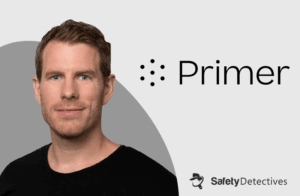
Published on: June 30, 2022 
Aviva Zacks of Safety Detectives recently interviewed Sean Gourley, CEO and Founder of Primer. They talked about how his company uses deep learning and NLP with the defense industry.
Safety Detectives: What motivated you to start Primer?
Sean Gourley: When I started Primer, I was seeing huge potential for the application of deep learning and natural language processing, and more generally, the incredible rise of artificial neural networks and a whole range of different applications. Seeing the technology increase in that way told me this was going to be an exciting space to enter.
Second, applying this technology to national security and intelligence was an opportunity where we could have a huge impact. And so, when we started Primer in 2015, we made two bets. One was on the continued advancement of artificial intelligence, and the second was on the increasing appetite for the defense and intelligence communities to make use of this technology.
SD: What would you say is your company’s flagship product or service?
SG: Our flagship product is called Primer Command, which is for real-time situational awareness. It allows users to connect different data streams into a single UI and deploy the best artificial intelligence to structure that data so that they can search it, navigate through it, and do all sorts of things on top of it.
So, it is really an interface for command and control. Command is the main Primer product that people get started with and underneath that, we’ve got the core infrastructure for building and deploying machine learning models, including custom training, tuning, and scaling those models as well.
SD: How does your company stay competitive among other companies like yours?
SG: It’s a fast-moving space, so we’ve made a huge investment into the core algorithms and the core infrastructure that support those algorithms. We keep pushing the capabilities forward and aim to move faster than everyone else.
SD: What’s your client base like?
SG: We have a big footprint in the defense and intelligence communities, both in the US and in countries overseas. We also have some equally large customers in the commercial space. Companies like Walmart, which has been a long-term customer of ours.
SD: What do you think are the worst cyber threats out there today?
SG: I think we’re going see the rise of generative technologies that will start mimicking human actors. And with that, we’ll see the generation of spear-phishing emails using artificial intelligence in a way that convinces you to take a set of actions. And the ability to clone voices such that when a machine calls you, it sounds exactly like your boss, for example.
I think the generative side of AI is perhaps the most transformational, like when the technology really can mimic any human on the planet exceptionally well. It will be possible to create fake identities that replicate real people in such a way that the recipients of that information find it more trustworthy than the actual person. That is going to open up a huge Pandora’s box as we start navigating through a world where we don’t know what’s real and what’s not.
SD: How do you think the pandemic has changed cybersecurity?
SG: Anytime you have a more volatile world, it opens up different attack surfaces. And the pandemic is certainly creating a more volatile world. I think there are going to be many more attack surfaces unfolding. This will have a bigger impact on the cybersecurity landscape. Take Ukraine for instance. We are still in the early days of that conflict, and there will be a lot more happening in the cyber domain where attacks will continue to be launched. That’s going to bring a focus into the cyber-attack domain.
Source of Article



